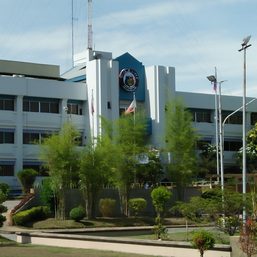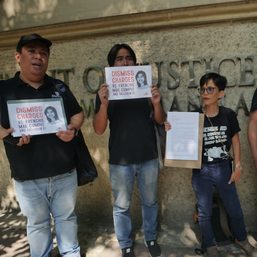SUMMARY
This is AI generated summarization, which may have errors. For context, always refer to the full article.

BAGUIO, Philippines – The Department of Interior and Local Government (DILG) in the Cordillera region on Tuesday, June 13, called on local governments to scrutinize the track records of non-governmental and civil society organizations.
This came as civil society groups in the Cordillera region expressed concerns about a memorandum from the DILG’s Kalinga office chief, which required groups to seek permission before conducting activities. It was seen as red-tagging.
It included a list of “Sectoral Front Organizations” which has drawn criticism for stigmatizing accredited organizations and hindering their ability to provide services.
The list was based on the Army’s 50th Infantry Battalion’s Periodic Status Report on Threat Groups.
“In a way, it will really affect their engagement. That is why we always remind LGUs (local government units) that it is up to them to examine the track record of the NGOs (non-governmental organizations) and CSOs (civil society organizations),” DILG-Cordillera assistant regional director Ruperto Garibbay Jr. said at the Dagyaw Open Government Town Hall Meetings press conference.
Garibbay said this in response to to the April 28 memorandum from DILG’s Kalinga office chief and Provincial Task Force to End Local Communist Armed Conflict (PTF-ELAC) secretariat head Anthony Manolo Ballug, urging local governments to require all groups to seek permission first before they carry out projects and programs in the localities.
While informing local governments of programs and projects of the private sector is standard procedure, NGOs and people’s organizations are alarmed as it arose from a resolution of the PTF-ELCAC.
“Many of the organizations listed have even been partners of local and community organizations, even the LGU in Kalinga, in the past to implement projects and activities for disaster response, environmental protection, and promotion of indigenous peoples’ rights and culture,” the Cordillera Human Rights Alliance said in a statement.
“With the release of this list, legal, even accredited organizations are further red-tagged and prevented from delivering services such as relief, medical services, rehabilitation projects, and more – services that the government could not sufficiently provide,” the group said.
Leaders and members of some of the organizations on the list have faced charges filed by the police and military, which the court eventually dismissed.
These include the Cordillera People’s Alliance (CPA), the Center for Health Education, Services and Training in the Cordillera, and the Alyansa Dagiti Pesante iti Taeng Kordilyera.
Development workers in the region were among those included in strings of charges in Ilocos Sur and a rebellion case in Abra.
In November 2020, Ballug, who was then the DILG director in Mountain Province, asked then-mayor James Pooten of Sagada to print and hang tarpaulins declaring the people behind CPA as persona non grata.
In a March 16 report, the Commission on Human Rights (CHR) in Cordillera said the persona non grata campaign against CPA by the NTF-ELCAC and the passage of resolutions by several local governments constitute red-tagging, violate the right to life, liberty, and security, and are discriminatory on account of political belief and opinion.
Cultivating distrust
Garribay clarified that CSO accreditation to participate in special bodies of local governments depends on the criteria under the guidelines released by the department.
He said that if they passed the set parameters, CSOs could participate in government programs, projects, and activities, noting that they complement their efforts.
“It is still within the local government units… to examine, determine the credibility of the CSOs and NGOs, whether they can help implement programs and projects,” he said.
He said the regional office would investigate the matter, saying they were unaware of Ballug’s memorandum.
Since 2018, DILG issued several documents to promote CSO engagement and participation in the programs and processes in the national and local governments.
The most controversial of these was Memorandum Circular 2021-012, issued in January 2021, which required those who want to participate in the Local People’s Councils to secure clearances from the police and military.
Protests from CSOs forced the office to amend the document and rescind the contested provision.
For long-time development worker Rhoda Dalang, the head of the Center for Development Programs in the Cordillera, Ballug’s memorandum cultivated distrust and further eroded efforts to encourage CSO participation.
“Trust is lost when DILG engages in red-tagging or does not do something to stop red-tagging,” she said on Tuesday.
Founded in 1986, CDPC provides aid for indigenous peoples’ communities to address their economic marginalization and protect their resources.
She said DILG tends to gravitate toward CSOs that are not critical of the government and “disregard the watchdogs.”
“To develop vibrant CSO participation in LGU governance, [they] should include more CSO watchdogs who will contribute more substantive policy reforms, program implementation, and good governance,” Dalang added.
Difficult times
“Even without the [PTF-ELAC] resolution, we follow protocol and inform the province, the municipality, down to the barangays of our projects and project areas,” said Jimmy Khayog, the executive director of Cordillera Disaster Response and Development Services (CDRDS), one of the NGOs on the list.
He said they have yet to meet their provincial staff to assess the impact of Ballug’s issuance on their project implementation and partners. But he added that being red-tagged has become a challenge in their work.
Established after the April 1987 earthquake that devastated communities in three Cordillera provinces, CDRDS (formerly known as Montañosa Relief and Rehabilitation Foundation Services Incorporated) provides services that address the disaster vulnerability of communities and develop their capacity to mitigate impacts through citizen-based, development-oriented disaster response.
Their projects in Kalinga include sustainable and climate-resilient agriculture, waterworks, and disaster preparedness training.
In earlier interview, Dalang said the difficulties of development work were nothing compared to the fulfillment of serving communities and seeing their projects bring change in people’s lives.
While this remains true, she said, the government’s campaign against communist rebels has made the Cordillera landscape riskier and more complicated.
According to her, irrelevant regulations related to the government’s counterinsurgency and anti-terrorism campaigns have made their work more difficult, especially for red-tagged NGOs.
“For red-tagged NGOs, getting support or counterpart from the LGUs is hard. Worse, some projects are turned down. It has also made recruiting staff difficult,” she said.
In an online petition against MC 2021-012, the International Center for Innovation, Transformation, and Excellence in Governance noted “the increasing regulatory requirements imposed on CSOs,” citing the 2019 Securities and Exchange Commission (SEC) guidelines for non-profit corporations on money laundering and terrorist financing.
Dalang said that despite the complications and threats, they continue to fulfill their mission, and that their work remains well-accepted and pursued by the communities.
Dalang said heir local partners tend to accept the projects and find ways to perform their part but stay silent on red-tagging, citing their experience in Kalinga. – Rappler.com
Add a comment
How does this make you feel?










![[Newspoint] A little walk-back](https://www.rappler.com/tachyon/2024/05/tl-a-little-walk-back-05182024.jpg?resize=257%2C257&crop=215px%2C0px%2C720px%2C720px)








There are no comments yet. Add your comment to start the conversation.